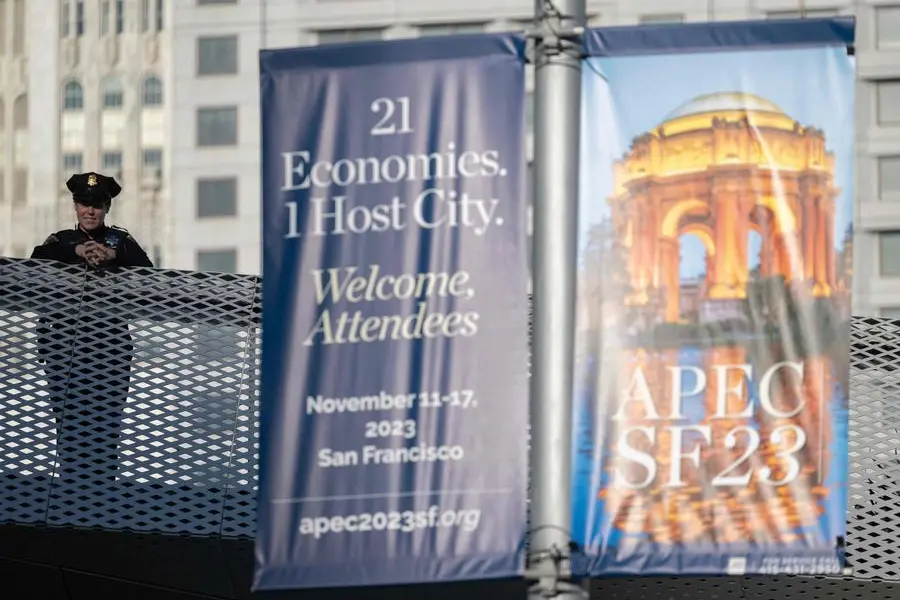PHOTO
The last time Xi Jinping travelled to the United States was six years ago to meet an effusive Donald Trump, who had promised "a very, very great relationship".
Instead, US-China relations spiralled to lower and lower depths, with the Chinese president now looking to stabilise ties when he sits down with Joe Biden in San Francisco this week.
The two leaders will meet on the sidelines of the APEC summit in the California city, their first encounter in a year despite trade tensions, sanctions, and the question of Taiwan feeding quarrels between the world's largest economies.
Positive momentum from November 2022 talks between Xi and Biden in Bali was derailed when the United States shot down an alleged Chinese spy balloon, delaying a planned visit by US Secretary of State Antony Blinken.
Since then, a flurry of high-level diplomacy, including Blinken's eventual trip to Beijing in June, has signalled ambitions on both sides to mend ties.
"I don't think anyone really has high hopes for the meeting in terms of there being concrete outcomes," said Joseph Liow from Singapore's Nanyang Technological University.
"This meeting is important for the symbolism that the leaders do want to set relations on a more stable footing."
Asked about Beijing's expectations for the meeting, China's foreign ministry remained vague, mentioning "in-depth communication" and "major issues concerning world peace".
"China attaches great importance to positive efforts to stabilise US-China relations," Chen Dingding, president of the Guangzhou-based think tank Intellisia Institute, told AFP.
Tactically for Beijing, "the key at present is to seek points of cooperation", said Lyu Xiang, US-Chinese relations expert at the Chinese Academy of Social Sciences (CASS).
'Calmer waters'
Xi is under pressure at home because of a weak economy, but also because of "the impression among at least part of the Chinese elites that the most important diplomatic relation for China... is being mismanaged," wrote Natixis CIB's Alicia Garcia Herrero in a note.
From Xi's perspective, "the ability to project an image of strength, of being in control of the bilateral relationship, of staring into calmer waters, will be politically useful," added Amanda Hsiao of International Crisis Group (ICG).
But several thorny issues could get in the way of smoothing out tensions.
In Beijing's view, Washington has "failed to implement the consensus of the two sides' talks (in Bali), leading to a period of stagnation for US-China relations this year," said Intellisia Institute's Chen.
Chen was cautious about Washington's overtures to China, saying that Biden could switch to a harder line on Beijing ahead of elections if he ends up facing off with Republican predecessor Trump.
China has also made clear that it will not budge on issues it considers red lines, such as Taiwan, which Beijing claims as its own territory to be seized one day, and its military expansion in the South China Sea.
Cautious optimism
Washington and Beijing have recently made some progress on trade and economic relations, and climate change talks.
Ahead of the APEC summit, US climate envoy John Kerry met with his Chinese counterpart Xie Zhenhua, while US Treasury Secretary Janet Yellen sat down with her opposite number last week too.
Xi will have dinner with top US business leaders on his trip, and is expected to push for a relaxation of US trade curbs in his talks with Biden.
"Trade tariff barriers, technology export controls, the blacklisting of Chinese companies, and restrictions on Chinese green energy products remain egregious and unacceptable," said CASS' Lyu.
"In these pragmatic areas, the US side must come up with serious measures for improvement."
The two leaders could also announce the resumption of military dialogue after a year-long suspension, which the ICG's Hsiao said would be "an extremely positive and actually very important outcome".
Yuan Zheng, also of CASS, told Chinese state media he thought the Russia-Ukraine and Hamas-Israel conflicts could also be discussed.
"While China and the US have some differences on these issues, they also share some common interests and perceptions," he said.





















